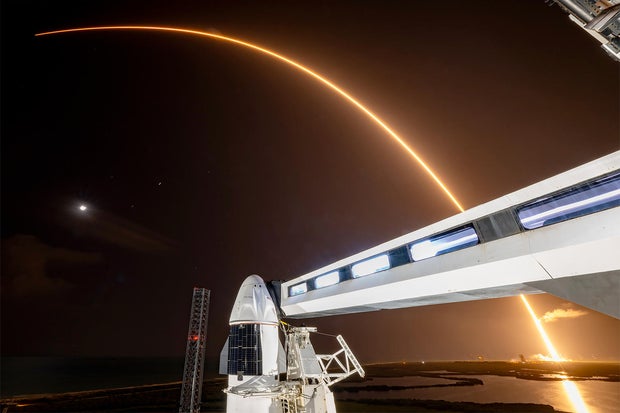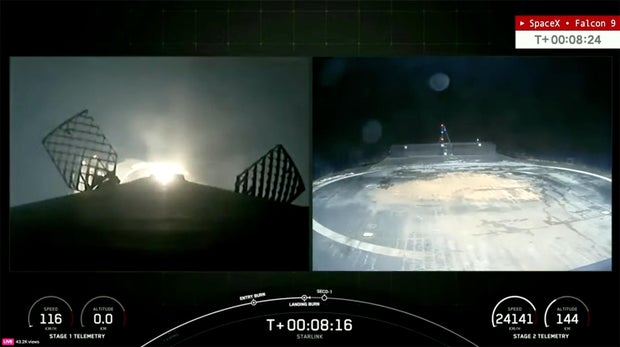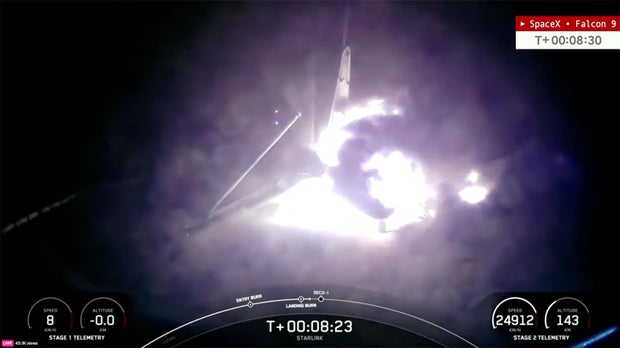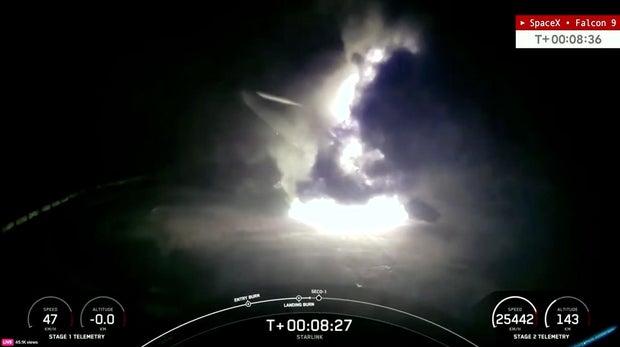[ad_1]
The Federal Aviation Administration has grounded SpaceX's Falcon 9 rockets pending an investigation into what caused the first-stage booster to fail. Collision with landing craft Early Wednesday after helping launch another batch of Starlink internet satellites.
after Standing After delaying the launch of its crewed Polaris Dawn spacecraft late Tuesday due to unfavorable long-term weather forecasts, SpaceX continued work on the first of a series of back-to-back Starlink satellite launches, one from Florida and the other from California.
But the second flight was canceled after the first stage used in the Florida launch broke apart and fell into the Atlantic Ocean while trying to land on a SpaceX drone ship stationed hundreds of miles northeast of Cape Canaveral.
SpaceX
The FAA said it would order an investigation, which would effectively ground SpaceX's Falcon 9 rockets — including the Polaris Dawn — until the investigation is complete and corrective actions are approved.
“The return of the Falcon 9 rocket to flight is dependent on the FAA determining that any system, process or procedure related to the anomaly does not impact public safety,” the FAA said in a statement.
“In addition, SpaceX may need to request and receive FAA approval to amend its license, which includes any corrective actions, and meet all other license requirements,” the agency added.
Late Tuesday, SpaceX postponed the launch of its Polaris Dawn mission, a commercial flight that will include the first non-government spacewalk, until Friday at the earliest due to weather expected at the end of the mission. The launch has now been suspended indefinitely pending an investigation into the landing incident.
The landing failure ended a streak of 267 successful booster recoveries in a row dating back to February 2021. However, the Falcon 9 rocket's second stage successfully carried 21 Starlink internet satellites to their planned orbit.
The first stage's descent appeared normal until the moment of landing when flames appeared larger than usual around the base of the rocket as it approached the surface of the rocket. One of the landing supports collapsed immediately upon landing, and the booster rocket, obscured by flames and smoke, flipped over the side of the landing craft into the Atlantic Ocean.
SpaceX
SpaceX
SpaceX
After a successful ascent, the first stage of the Falcon 9 rocket flipped over after landing on the spacecraft's “zero gravity” drone ship, SpaceX He said on social media“Teams are evaluating the rocket's flight data and condition.”
This was the 23rd first stage of the B1062 rocket, which turned out to be its last launch and landing, setting a new reusability record. SpaceX is licensing Falcon 9 first stages for up to 40 flights per stage.
Shortly after deploying the Starlink satellites in Florida, the company canceled the California launch, which had been scheduled for 5:58 a.m. EST, to give engineers more time to review telemetry and video footage for any signs of a problem that could affect other rockets.
“We are pushing back our second @Starlink launch at night to give the team time to review the booster landing data from the previous launch,” SpaceX said. He said“A new target launch date will be shared as soon as it is available.”
[ad_2]
Source



